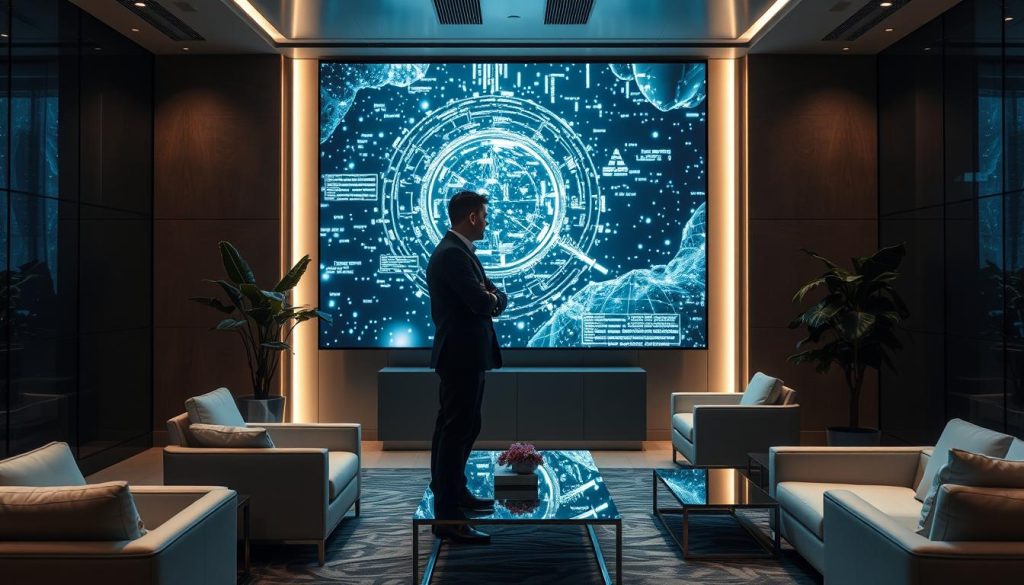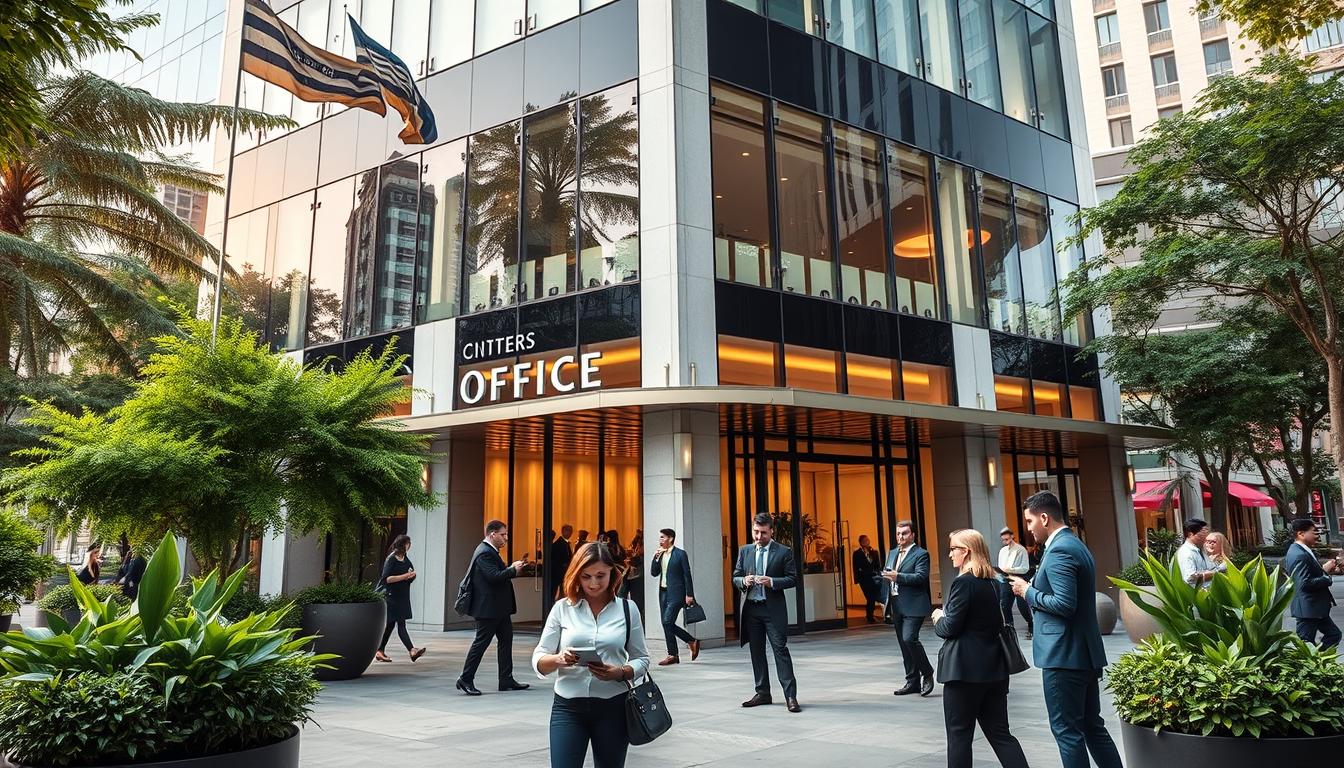“Innovation distinguishes between a leader and a follower.” – Steve Jobs.
Today’s rich people don’t just follow trends, they set them. They use virtual addresses as a key tool. It shows they value privacy yet want to stay connected. At GPWorkspace, we’ve noticed more people choosing virtual addresses. They see it as a way to blend into the tech world while staying private.
Innovators and financiers alike find virtual addresses very useful. It links the digital possibilities with the real world. We help people get these benefits for their own business pursuits.Many aspiring entrepreneurs are turning to the internet to start their businesses. But, having a virtual address can really help them stand out. We help them get noticed with top-notch virtual address services. It makes doing business more flexible.
A virtual address isn’t just about wealth. It’s about crafting a new image of success. It tells the world you’re ready to lead from anywhere. At GPWorkspace, we give you the tools for innovation and exclusivity.
The Allure of Virtual Spaces for the Wealthy
The metaverse and virtual real estate are gaining popularity among the wealthy. They are not just watching from the sidelines. These individuals are leading the way in these digital spaces, looking for privacy and luxury.
Forbes has taken a deep look into these markets and blockchain technology. This marks a new era where major publications and the wealthy push for merging virtual and financial worlds. Forbes launched an ERC-721 token and made a “virtual billionaires” NFT collection, based on real stock prices. They’re shaping the future of the digital world.
- As of February 2021, MANA (Decentraland’s currency) prices have skyrocketed by 321% from the previous year. This shows growing interest in virtual real estate.
- Starting at $100 per parcel, LAND in Decentraland now costs about $1,400 per undeveloped parcel. This highlights the huge rise in virtual land value.
- A virtual property in Axie Infinity was sold for $1.5 million. This shows the big money and interest moving into digital spaces.
The success of the metaverse shows it’s a lucrative investment for the affluent. Over $30 million in secondary LAND sales in Decentraland proves its worth. The community of users and investors is also expanding. The elite’s interest in digital spaces is changing the game. NFTs are more than new art forms—they’re key investments. These trends are blending the future of the metaverse with global wealth and prestige.
Emerging Trends in the Relationship Between Wealth and Technology
As we explore the changing world of technology trends, we see their effect on wealth disparity. The rise of the digital world, like metaverse development, brings both chances and issues. Tech billionaires lead the way, changing how people across different social and economic backgrounds connect.
Technology innovations are changing how wealth is shared worldwide. The top 10% of the world, often tech leaders, have 52% of global income as of 2021. In contrast, the bottom 50% only have 8%, showing a big wealth disparity. This situation highlights the need for fair tech access. Metaverse aims to provide this by opening digital worlds to everyone.
The job market has also shifted, with 473 million people unemployed in 2022, many due to tech changes. Tech advancements have caused more wealth but also more inequality. This is especially true in places where tech billionaires do well.
| Aspect | Prevalence in Developed Countries | Prevalence in Developing Countries |
|---|---|---|
| Inequality Induced by Tech Innovation | Highly prevalent, widening gap | Moderately prevalent |
| Access to ICT | Extensive | Limited |
| Impact on Income Disparity | Increases disparity | Slightly reduces over time |
While technology gives tools for growth and better productivity, it first increases income gaps. Metaverse development could change this by offering access to everyone. This could help lessen the big inequalities we see now.
Looking at these statistics and trends, it’s clear all tech community members must work towards inclusive growth. By removing obstacles and ensuring equal access, everyone benefits. This also allows people who were left out to join the digital movement led by tech billionaires.
Rich People Use Virtual Address: The Power of Privacy and Discretion
Today, as the lines between public and private lives blur, rich people prioritize privacy. A virtual address is key for them to live luxuriously with privacy. It’s not just an alternate mailing address. It’s crucial for managing personal info and avoiding unwanted public attention.
At GPWorkspace, we believe luxury isn’t just about being seen. It’s about moving with stealth, efficiently and quietly. Our top-notch virtual address services keep your private life private. Whether you’re a business bigwig or a solo entrepreneur, we ensure your privacy is protected.
With digital connections growing, affluent people need more privacy. Virtual addresses let them control access to their info. It’s a vital part of keeping their lives private in a digital world.
| Privacy Feature | Benefits |
|---|---|
| Anonymity in Registrations | Prevents direct association of your name with certain business activities or locations. |
| Secure Mail Handling | Professional management and confidential processing of all physical and electronic correspondences. |
| Location Flexibility | Operate from anywhere globally without binding your business or personal reputation to a single physical location. |
The demand for privacy grows as our world becomes more connected. Tools like virtual addresses are essential. They protect your info while letting you connect globally. And they keep your physical presence private.

Choosing a virtual address means you value your privacy in a public world. It helps you stay connected and protected at the same time. At GPWorkspace, we see privacy as a necessity for your business and personal life. It keeps you visible or invisible, just as you need.
Virtual Addresses: Beyond Status, a Tool for Global Connectivity
Today, global connectivity is more than a buzzword for businesses. Virtual addresses help entrepreneurs establish an international presence. They let businesses grow without the cost of physical offices.
The market for virtual offices was worth USD 47.20 billion in 2022. It’s expected to hit USD 137.65 billion by 2029, growing at 16.5% a year. This growth shows businesses are turning to virtual solutions to stay competitive globally. Companies like Anytime Mailbox and CallHippo lead by offering virtual business addresses and phone numbers in over 50 countries.
Virtual addresses offer more than just expanding the market. They provide a sustainable way to operate in major economic centers while supporting remote work. This need became clear during the COVID-19 pandemic. Virtual offices helped businesses overcome physical barriers, improving employee satisfaction and work-life balance.
| Service | Coverage | Pricing (USD) |
|---|---|---|
| Anytime Mailbox | Global | Varies by location |
| CallHippo | Over 50 countries | $18 – $42 per user/month |
| Google Voice | Integrated with Google Workspace | Free |
Tools like Google Voice improve communication crucial for international business. Within Google Workspace, it offers a seamless way to manage calls, texts, and voicemails. It gives businesses a local phone number, no matter where they are.
We see the challenges entrepreneurs face in going global. Our solution blends virtual addresses with the support modern businesses need to succeed everywhere. By using these tools, businesses are not just adapting. They are innovating and setting new standards for a connected world.
Integrating Virtual and Physical Spaces: The Best of Both Worlds
We stand at an exciting turning point in how we blend different spaces. The coming together of real-world places and online environments is creating something new. We call this the physical-virtual workspace synergy. It’s changing how we do business, learn, and connect, especially at work.
In schools and medical training, this blend offers richer learning experiences. Students work with 3D models in labs while still engaging face-to-face with others. These blended environments help them grasp and remember things better by combining hands-on practice with social interaction.
For workers, the change is just as big. Professionals there use both virtual offices and real meeting rooms globally. This mix offers the look of a conventional office plus the chance to meet with people everywhere without leaving home.
| Service | Locations | Starting Price | Special Features |
|---|---|---|---|
| Davinci Virtual | Over 1,500 locations in 50+ countries | $49/month | Tailored virtual office services |
| Alliance Virtual Offices | Over 1,100 locations in 40 countries | $49/month | Comprehensive virtual office plans |
| Sococo | Virtual | $13.49/month per seat | Up to 300 minutes of voice/video conferencing |
| Allied Offices | Locations across the U.S. and Canada | Variable | 24/7 access and U.S.-based receptionist services |
New Mixed Reality (MR) tools are blending the digital and real worlds even more. They let us interact with both physical items and virtual objects in real-time. MR makes working together more natural and enjoyable and solves many challenges in creating unified blended environments.
The future of combining physical and virtual spaces is full of possibilities. It could change how we work, learn, and socialize, making everything more flexible, efficient, and creative. We’re at the brink of redefining our surroundings and discovering what it means to live in such innovative spaces.
Conclusion
The digital age and the need for flexible workspaces are changing how professionals operate. We see this in the behavior of successful people around the world. Today, about 85% of employees want to work remotely. Meanwhile, 16% of companies are already fully remote. Virtual offices bring many benefits. They offer privacy, enhance your business image, and allow you to operate globally, just like big corporations do.
Adapting to digital changes is crucial for keeping up with the times. This is key to safeguarding your business or brand for the future. The move to remote work shows the importance of digital tools for teamwork and productivity. Now, all sorts of businesses, from finance to health, use virtual addresses. They help these businesses stay flexible, follow regulations, and remain competitive.
In today’s world, innovation is a must, not a choice. Virtual addresses have quickly become necessary, not just fancy extras. They provide flexibility, security, and a sense of belonging. GPWorkspace shows that the future of work is already here. It’s turning out to be more inclusive, efficient, and empowering than we thought. Let’s embrace these opportunities, boost our growth, and lead with creativity in this fast-paced digital world.


